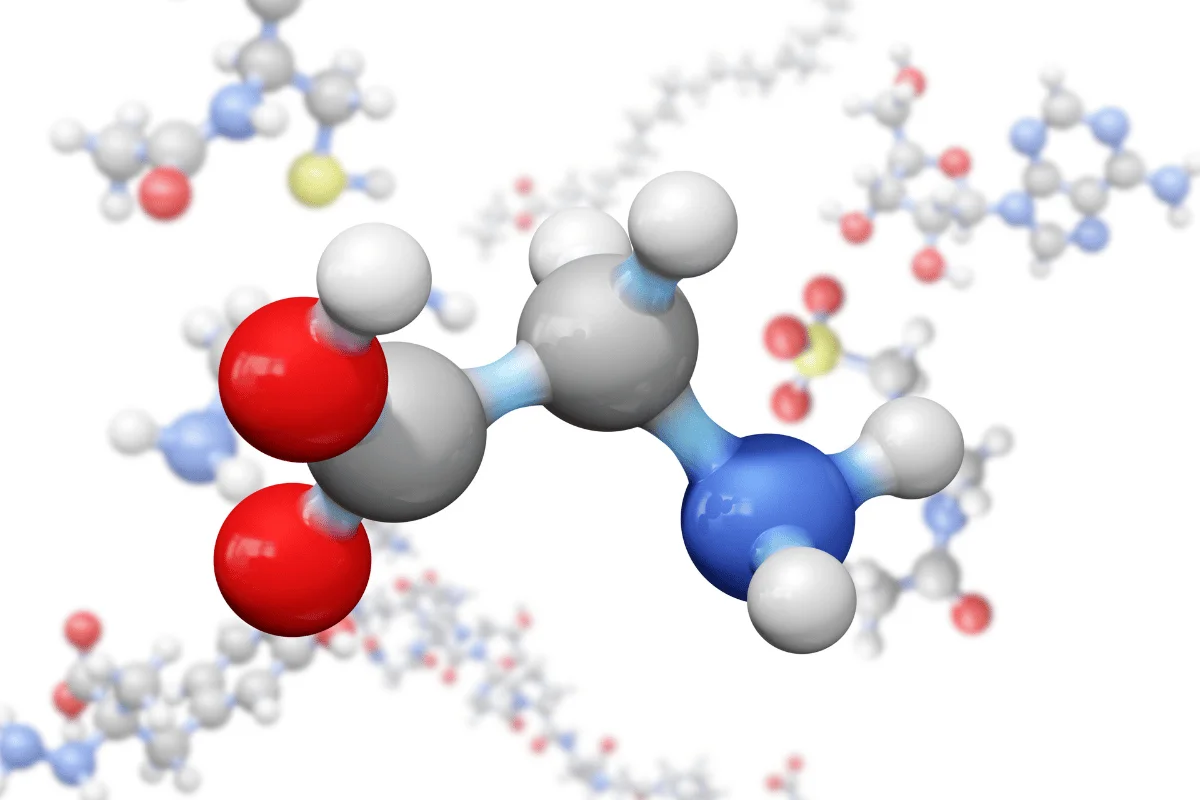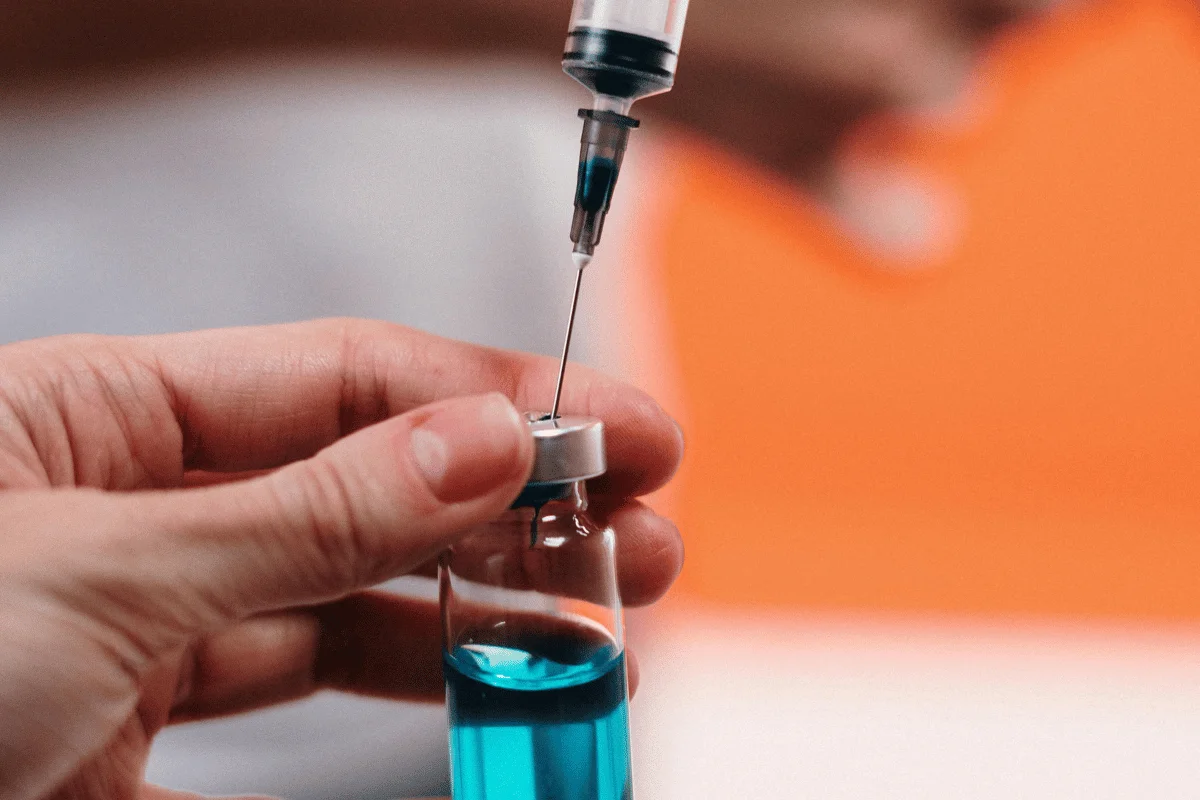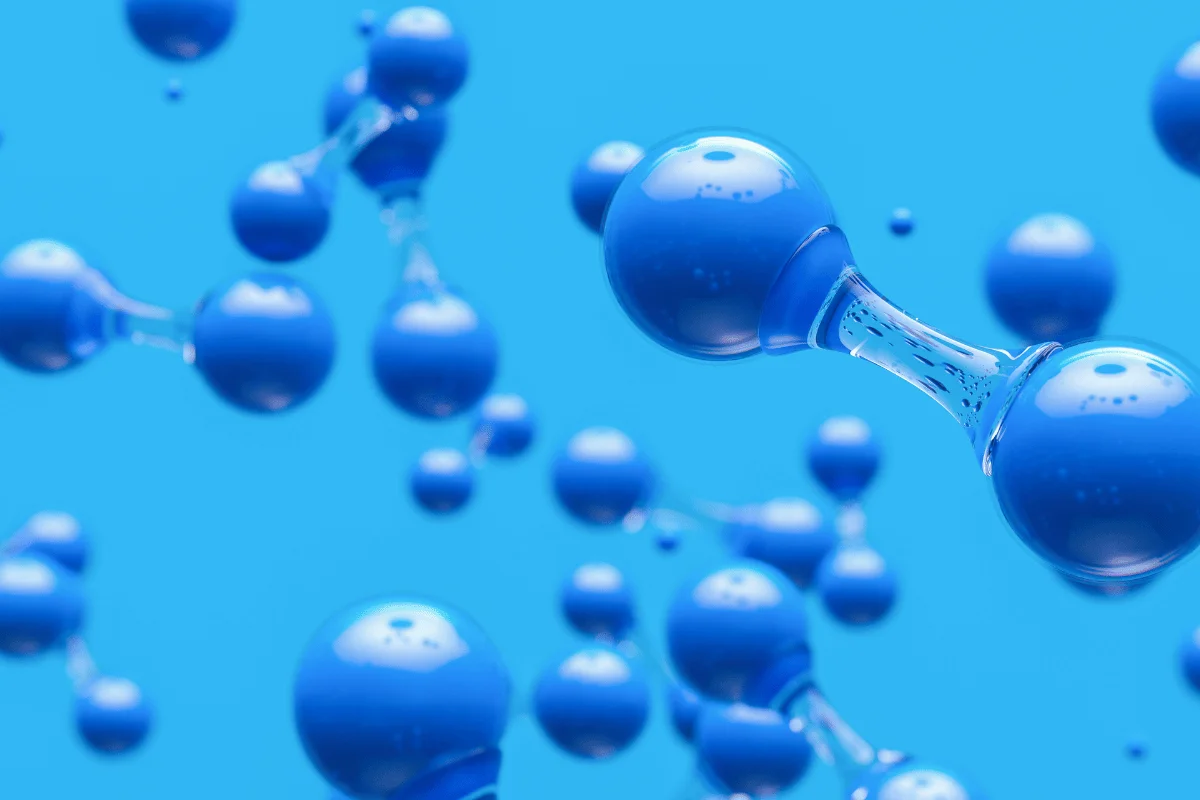[Disclaimer: The information in this article is intended for general informational and educational purposes only. It is not meant to substitute medical advice from your physician or healthcare provider. Consult a medical professional with any health-related questions or concerns.]
Energy in our bodies isn’t easy to explain.
For a physicist, “energy is just the ability to do work.” A biologist might say it’s our body’s fuel for everyday tasks.
For us, it’s a combination of both. When we say we need more energy, we usually mean feeling strong, alert, and able to do things without getting tired. It’s about having the stamina to get through our day.
So when we look at the best peptides for energy, we’re really asking: Which can help us feel more energetic and less tired? Which ones can make us feel stronger and able to do more?
Let’s answer these questions!
TL;DR – Best Peptides for Energy
Short on time? Here’s a quick rundown of the top energy peptides:
| Peptide | Primary Benefit |
|---|---|
| MOTS-c | Enhances cellular energy and metabolic flexibility |
| SHLP2 | Improves energy balance and insulin sensitivity |
| 5-Amino-1MQ | Boosts metabolism and glucose absorption |
| Humanin | Protects cells and improves metabolism |
| Semax | Enhances mental energy and cognitive function |
| Selank | Promotes calm focus and mental clarity |
| CJC-1295 | Increases growth hormone for better energy and recovery |
| Ipamorelin | Boosts metabolism and improves body composition |
| PT-141 | Enhances sexual energy and overall motivation |
| DSIP | Improves sleep quality for better daytime energy |
| MK677 | Increases deep sleep and growth hormone release |
Note: Always consult a healthcare professional before starting any new supplement regimen. These peptides work best as part of a healthy lifestyle.
Role of Peptides in Energy Production
When we talk about energy in our bodies, it’s a complex system with different parts working together.
Our body’s energy system can be broken down into five main areas: cellular, mental, hormonal, sexual, and sleep-related energy. Each plays a crucial role in how energetic we feel overall.
Here’s how peptides help in these energy restoration and optimizations:
- They can increase blood flow to specific parts of your body (angiogenesis) by helping create new blood vessels. More blood flow often means more energy.
- As we age or get sick, our bodies might not make as many of certain natural peptides or hormones. Some peptide supplements can help get that production back on track.
- Some peptides can temporarily boost natural hormones, making certain body processes work faster or better.
- If part of a cell, tissue, or organ is damaged, some peptides can help repair it.
The beauty of peptides is their specificity. They can target particular receptors on cell membranes, which means they can help exactly what needs it without messing with other things.

Benefits of Using Peptides for Increased Energy Levels
Peptides offer a well-tolerated means of increasing your energy levels. Benefits include:
- Increased Exercise Endurance: Growth hormone peptides can let you push harder and longer without hitting exhaustion. Ideal for athletes!
- Greater Strength and Stamina: Peptides may assist with growing lean mass and reducing fat, possibly amplifying physical and mental exertion capacity.
- Less Brain Fog: Certain peptides could help clear cognitive cobwebs by enhancing blood flow, neuron connections, and messenger chemicals.
- Better Sleep Quality: Some peptides might moderate hormones for deeper, more restorative sleep.
- Slowed Aging: Anti-aging peptides like Epithalon may help defend against cellular damage accumulating over time.
- Disease Protection: Immune and inflammation-modulating peptides could aid in guarding against sickness and related fatigue.
- Weight Loss Acceleration: Fat loss peptides may improve insulin sensitivity and potentially ramp up metabolism for easier slimming.
- Enhanced Sexual Vitality: Compounds like PT-141 might stimulate libido receptors, possibly increasing arousal and enjoyment.

Top 11 Peptides for Energy Boost
We have compiled these science-backed compounds that could re-energize your body and mind:
The Best Peptides for Cellular Energy
The foundation of energy starts at the cellular level (mitochondria). Whatever you do daily, you’re essentially spending ATP (adenosine triphosphate), our cells’ energy currency.
Here are some peptides that may help you with more cellular energy:
1. MOTS-c
MOTS-c is a short chain of 16 amino acids produced from DNA within the energy-generating mitochondria inside our cells.
This makes MOTS-c part of a newly discovered class of molecules called mitochondrial-derived peptides (MDPs).
It activates AMPK (AMP-activated protein kinase), a key regulator of cellular energy homeostasis.
An article published in the “Nature Communications” journal in 2021 discussed the connections between MOTS-c with exercise and metabolism.
Here are the key findings:
- MOTS-c Improves Physical Performance: When young mice (2 months old), middle-aged mice (12 months old), and old mice (22 months old) were treated with MOTS-c, they all showed significantly enhanced physical performance on a treadmill test.
- Metabolic Flexibility: MOTS-c treatment improved what scientists call “metabolic flexibility” in old mice. This term refers to the body’s ability to switch between using carbohydrates and fats for fuel. We typically lose some of this flexibility as we age, but MOTS-c seemed to restore it.
In human subjects, endogenous MOTS-c levels in skeletal muscle increased 11.9-fold after exercise compared to pre-exercise levels. This increase remained high even after 4 hours of rest.
The MOTS-c treatment also helped maintain better blood glucose levels, reduced fat mass, and modestly reduced age-related loss of lean mass in old mice.
While these results are extremely promising, much of this research has been done in mice. Human trials are still in their early stages.

2. Humanin
Humanin has many scientific studies backing it up, and many people who’ve tried it say it really works.
Humanin is a 24-amino acid peptide first discovered in 2001 during a screen for proteins that could protect against Alzheimer’s disease-related toxicity. It acts as a cytoprotective factor, meaning it helps protect cells from various types of stress.
Its mechanisms of action include:
- Anti-apoptotic Effects: It prevents programmed cell death under stress conditions.
- Metabolic Regulation: It improves insulin sensitivity and glucose metabolism.
- Anti-inflammatory Actions: It reduces inflammation at the cellular level.
- Antioxidant Properties: It helps protect cells from oxidative stress.
A review in “Trends in Endocrinology & Metabolism” highlights the following findings:
- Humanin levels decrease as we age (which might explain why we feel more tired as we get older):
- 20% between ages 45-65 and 66-80
- An additional 30% in individuals over 80 years old
- Humanin administration can reduce blood glucose levels by 30-40% within 2 hours, potentially helping with diabetes
- It protects cells from oxidative stress
While Humanin doesn’t directly boost energy production like MOTS-c, its effects on cellular health and metabolism can indirectly improve energy levels.
3. SHLP2
SHLP2 is another mitochondrial peptide similar to Humanin. It’s part of a group of six “Small Humanin-Like Peptides” (SHLP1-6) that scientists discovered more recently.
A new study in “Nature Communications” in 2023 sheds light on how SHLP2 affects energy balance:
- Energy Homeostasis Regulation: SHLP2 activates specific neurons in the hypothalamus that control appetite and energy expenditure.
- Insulin Sensitivity: It improves cells’ response to insulin, enhancing glucose metabolism.
- Thermogenesis: SHLP2 increases energy expenditure by promoting heat production in brown adipose tissue.
SHLP2 works on multiple levels:
- It can reduce appetite, potentially preventing overeating
- It helps your cells use energy more effectively by improving insulin sensitivity
- It helps your body burn more energy

4. 5-Amino-1MQ
5-Amino-1MQ is slightly different – it targets a specific enzyme in your body.
It is a small molecule that inhibits an enzyme called Nicotinamide N-methyltransferase (NNMT). NNMT plays a big role in how your body uses energy.
By blocking NNMT, 5-Amino-1MQ can:
- Increase the production of NAD+ (a crucial molecule for energy production)
- Help your cells absorb sugar more effectively
- Potentially boost your overall metabolism
A comprehensive study published in “Scientific Reports” provided some exciting data:
- In mice fed a high-fat diet, treatment with 5-Amino-1MQ resulted in a 7% reduction in body weight over 12 weeks compared to untreated mice.
- Fasting glucose levels decreased by 19% in treated mice (from 180 mg/dL to 146 mg/dL).
- Insulin sensitivity improved significantly.
Another study in “Nature Communications” delved deeper into the metabolic effects:
- When combined with a reduced-calorie diet, 5-Amino-1MQ treatment led to a 40% greater reduction in body fat than diet alone.
- Energy expenditure increased by 5-10% in treated mice without changes in physical activity.
All of these results point toward 5-Amino-1MQ being a potential energy enhancer!

The Best Peptides for Mental Energy
When we talk about mental energy, we’re talking about how alert we are and how well we can concentrate.
Sure, there are some prescription drugs that can help with this. But they don’t work for everyone and can have some not-so-great side effects.
Here are some two peptides that may help:
5. Semax
Semax is known for its nootropic (cognitive-enhancing) and neuroprotective (protecting your brain cells from damage) properties. It’s widely used in Russia to treat a variety of neurological conditions.
Semax is a synthetic analog of an adrenocorticotropic hormone (ACTH) fragment. It’s a lab-made version of a small piece of a hormone your body naturally produces.
It works by:
- Stimulating the release of brain-derived neurotrophic factor (BDNF), which helps your brain cells grow and survive
- Increasing dopamine and serotonin levels in the brain, boosting mood and motivation
- Enhancing neuroplasticity (your brain’s ability to form new connections) and neuroprotection
These actions can lead to improved cognitive function, mood, and energy levels.
Studies on Semax have shown:
- Improved recovery after stroke in clinical trials
- Enhanced memory and learning in animal studies
- Neuroprotective effects in models of brain injury
- Potential anti-inflammatory properties
Semax is typically administered as a nasal spray. Effects are usually felt within 5-15 minutes and can last several hours.
6. Selank
Selank is also a synthetic peptide developed and known for its anti-anxiety and nootropic effects.
Selank is a heptapeptide, which simply means it’s made up of seven amino acids. It works by:
- Modulating GABA receptors in the brain (GABA is your brain’s main “calming” neurotransmitter)
- Increasing brain-derived neurotrophic factor (BDNF)
- Regulating serotonin and dopamine levels, two key neurotransmitters involved in mood and motivation
These actions can lead to a calm yet focused state, potentially boosting mental and physical energy.

The Best Peptides for Hormonal Energy
Hormones, like growth hormone (GH), IGF-1, testosterone, and estrogen, affect many things in our bodies. They control our muscles, fat, hunger, how well we exercise, and even our sex drive.
Out of all these hormones, GH is the most important for energy. When we have more GH, we get stronger, have more stamina, sleep better, and recover faster after working out.
Here are some peptides that can change our GH levels:
7. CJC-1295
CJC-1295 is a growth hormone-releasing hormone (GHRH) analog. It stimulates the release of growth hormone from your pituitary gland.
It is part of a family of GHRH agonists, including sermorelin, Mod-GRF, and Tesamorelin, all of which cause sustained increases in GH levels.
What does growth hormone have to do with energy? Quite a lot:
- Fat Burning: Growth hormones tend to break down fat for energy. More fat burning = more fuel for your body.
- Muscle Growth: It can promote lean muscle mass. More muscle means a faster metabolism and more energy throughout the day.
- Cell Repair: Growth hormone aids in cell regeneration. Healthier cells function better, leading to improved energy levels.
A study published in the Journal of Clinical Endocrinology & Metabolism found that CJC-1295 increased growth hormone levels for up to 6 days after a single dose.
In this study, healthy subjects were given either a placebo or CJC-1295 at 30 or 60 μg/kg doses. The 60 μg/kg dose increased serum GH and IGF-I levels by 46% and 45%, respectively.
8. Ipamorelin
Ipamorelin, on the other hand, is a growth hormone secretagogue. Because of its targeted effects and minimal side effects, it’s often called the “gentle GHRP.”
It also promotes growth hormone release but through a different mechanism.
Ipamorelin mimics ghrelin, often called the “hunger hormone.” Here’s how Ipamorelin can give you an energy boost:
- Metabolism Boost: Ipamorelin can speed up your metabolism by increasing GH levels. A faster metabolism means more energy production.
- Improved Body Composition: Ipamorelin can help reduce body fat and increase lean muscle mass. This shift in body composition can lead to higher energy levels.
- Better Recovery: Faster recovery from exercise means you’ll have more energy for your next workout or daily activities.
- Enhanced Sleep: Many users report improved sleep quality with Ipamorelin. And as we know, better sleep = more energy!
Research on Ipamorelin is promising. One study on female GH-deficient and GH-intact mice found that Ipamorelin increased body weight by 15.3% in GH-deficient mice and 16.9% in non-GH-deficient mice over nine weeks.
It probably happens due to the adipogenic effects of Ipamorelin. It refers to forming fat cells, also known as adipocytes. Once mature, these fat cells can store energy as fat. This is important for energy balance in the body.
Ipamorelin also increased food intake during the first week and raised serum leptin levels at two weeks. Leptin is a hormone that helps regulate energy balance, so this could explain some of Ipamorelin’s energizing effects.

The Best Peptides for Sexual Energy
Scientists have recently found out that the melanocortin system controls our sexual energy. This system uses natural peptides in our body to turn on and off different parts of our sexual response.
Here is one peptide that may help your cause:
9. PT-141
PT-141 is also known as bremelanotide. Originally developed as a tanning agent, researchers accidentally found out it could also boost energy and increase sexual arousal.
PT-141 activates melanocortin receptors in the brain. Think of these receptors as switches that, when flipped, trigger a cascade of effects in your body.
These effects include:
- Increased dopamine release (dopamine is often called the “feel-good” neurotransmitter)
- Enhanced motivation and arousal
- Improved mood and energy levels
Unlike drugs that directly affect blood flow, PT-141 acts on your brain’s control center. This unique approach makes it a fantastic option for increasing physical and mental energy.
Clinical studies on PT-141 have shown promising results:
- In a phase 2B trial, PT-141 significantly improved erectile function scores in men with ED.
- 53% of men taking a 15 mg dose achieved normal erectile function.
- 66% reported improved erections at doses of 10-20 mg.
- The effects lasted for 6-72 hours after a single dose.
While most research has focused on sexual function, users often report increased energy, motivation, and well-being as “side effects.”

The Best Peptides for Sleep
Good sleep is the best way to feel more energetic, but it’s becoming harder to get.
Luckily, some peptides can help you sleep longer and better.
10. Delta Sleep-Inducing Peptide (DSIP)
DSIP is a natural peptide found in our brains that helps regulate sleep.
An open study in 1984 conducted by H.E. Kaeser focused on patients with severe insomnia. A series of 10 injections of DSIP was given to the subjects.
Here is what he found:
- 6 out of 7 patients (about 86%) had their sleep normalized
- The positive effects lasted for 3-7 months after treatment
- Patients also reported improved mood and daytime performance
A 1981 clinical trial by Schneider-Helmert and Schoenenberger studied the effects of DSIP on people with sleep problems.
The study found that DSIP improved sleep duration and quality, increased REM sleep, and had no significant side effects.
Interestingly, DSIP showed a slight arousing effect in the first hour after injection, followed by sleep-promoting effects in the second hour, leading researchers to conclude it has a “normalizing influence on human sleep regulation.”
11. MK677
MK677, also known as Ibutamoren, isn’t technically a peptide, but it works in a similar way. It mimics the action of ghrelin, a hormone that stimulates growth hormone release.
Here is how MK677 helps with sleep:
- It can increase the amount of deep, slow-wave sleep you get.
- Some users report more vivid dreams, which might be a sign of better REM sleep.
- It might help with recovery and repair by boosting growth hormones while you sleep.
A study published in the Journal of Neuroendocrinology examined MK677’s effects on sleep in young (18-30 years) and elderly adults (65-71 years).
They participated in a 7-day and 14-day treatment period, where they received 5 and 25 mg and 2 and 25 mg of MK-677, respectively, over two periods.
They found:
- It increased the duration of REM sleep by about 20% per night in young adults.
- In older adults, it boosted stage 4 sleep (the deepest kind) by about 50%.
These results are pretty exciting because deep sleep tends to decrease as we age. MK677 might help older adults get more of that restorative sleep they need.

How to Use Peptides Safely for Energy
When administering peptides, adhere to these guidelines for optimal effects with minimal side issues:
- Get a Medical Workup: Discuss peptide options based on health status, medications, and hormone panels with your doctor. Get vital signs monitored.
- Start Low, Go Slow: Begin peptides at lower doses, assessing your response before gradually increasing amounts.
- Time Strategically: Take peptides when their effects best fit your schedule and energy demands.
- Watch for Changes: To finesse your peptide regimen, track energy, sleep, mood, motivation, and any side effects.
- Choose Quality Products: Only purchase peptides from reputable sources. Low-quality products can be ineffective or even dangerous.
- Cycle Judiciously: Give your body breaks between peptide cycles for homeostatic regulation to avoid dependence.
- Combine with Healthy Habits: Peptides work best with a healthy diet, regular exercise, and good sleep habits.
- Be Patient: It can take time to see results. Don’t expect an immediate energy boost overnight.

Are There Side Effects of Energy-Boosting Peptides?
When used carefully under medical guidance, peptides are highly safe for fighting fatigue and dysfunction. Most energy-related peptides simply trigger your body’s natural hormones and processes.
However, peptides could potentially cause issues like:
- Injection site reactions
- Allergic reactions
- Hormonal fluctuations
- Changes in blood sugar
- Gastrointestinal upset
- Lightheadedness
Also, since many peptides are relatively new, their long-term effects are not fully understood.

Frequently Asked Questions (FAQs)
Still have questions? Let’s address some common queries about peptides for energy.
Can Peptides Be Combined with Other Supplements?
Yes! Pairing peptides with nutraceuticals like antioxidants and adaptogens often supplement benefits.
Under a doctor’s guidance, certain prescription agents may also couple well with peptides.
Are Peptides Safe for Long-Term Use?
Many peptides are relatively new, and their long-term effects haven’t been extensively studied in humans.
Many practitioners recommend cycling peptides (periods of use followed by breaks) to mitigate long-term risks.
Do Peptides Require a Prescription for Use?
Some peptides (FDA-approved for specific medical conditions), like Tesamorelin, require prescriptions. However, some peptides are sold as “research chemicals” and technically don’t require a prescription.
However, using these without medical supervision can be risky.
Do Collagen Peptides Give You Energy?
Collagen peptides are taken more for benefits like skin/joint health and workout recovery.
But collagen may also support gut health and improve sleep quality, which are linked to overall energy and well-being.
Conclusion – Best Peptide for Energy
Energy is the currency of life, and peptides offer a promising new way to boost energy. Remember, though, that peptides work best when used in conjunction with a holistic approach to health.
If you’re passionate about optimizing your energy and overall health, All About Peptides is your go-to resource. We’re dedicated to providing cutting-edge information on peptide therapy and biohacking.
Join our newsletter and connect with fellow biohackers. We’ll share insider tips on using peptides for energy, longevity, and more. Let’s optimize our health together!








